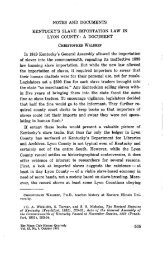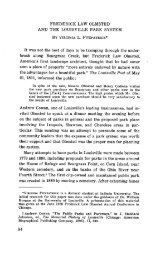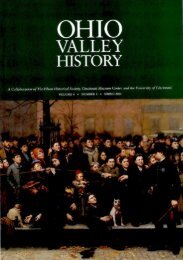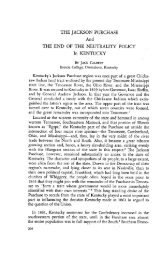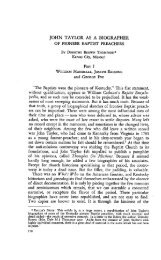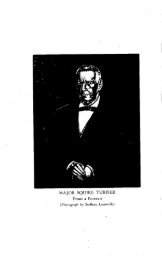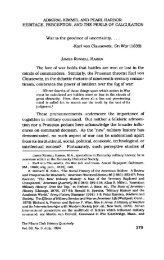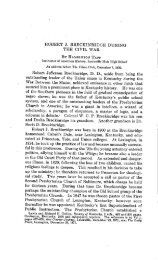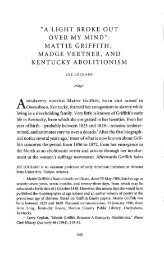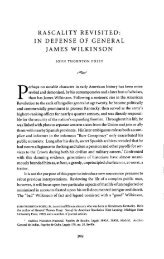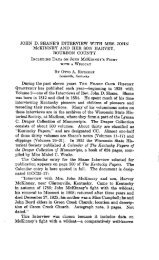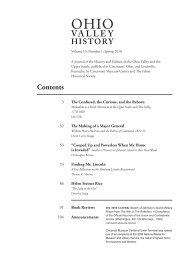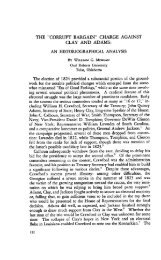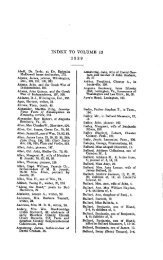JOHN M. HARLAN IN KENTUCKY, 1855-1877 THE STORY OF Hm ...
JOHN M. HARLAN IN KENTUCKY, 1855-1877 THE STORY OF Hm ...
JOHN M. HARLAN IN KENTUCKY, 1855-1877 THE STORY OF Hm ...
You also want an ePaper? Increase the reach of your titles
YUMPU automatically turns print PDFs into web optimized ePapers that Google loves.
<strong>JOHN</strong> M. <strong>HARLAN</strong> <strong>IN</strong> <strong>KENTUCKY</strong>, <strong>1855</strong>-<strong>1877</strong><strong>THE</strong> <strong>STORY</strong> <strong>OF</strong> <strong>Hm</strong> PRE-CouRT POLITICAL CAREERBY Louis HARTZOmaha, NebraskaHarvard University, Cambridge, Massachusetts'IOvershadowed by his long and significant service on theUnited States Supreme Court (<strong>1877</strong>-1911), the Kentucky careerof John Marshall Harlan remains virtually unexplored. Yetfew bore a more consistently significant role in the swift-movingdrama of deepening crisis and Ci•.l War and Reconstruction inthe border state.The early years of that drama reveal the Whig party in Kentuckyset adrift by the death of Henry Clay and the impatientchallenges of the slavery question, never again to reconquer theunity and strength it possessed under the leadership of the GreatCommoner from Ashland. Indeed it was a cruel thrust of historythat cast young Harlan, with Whig affiliations inherited from hisfather, James Harlan, twice Attorney-General and twice congressmanunder the Whig banner, into the political arena at themoment of party collapse. But only eagerness and confidencestreamed through the mind of the strapping six-foot, two-hundred-poundyoung man who emerged from Clay's own congressionaldistrict. Fresh from Centre College and legal studyat Transylvania university, he flung himself, with an energycharacteristic of his whole living, into the first adventure of thewandering Kentucky Whigs who now sought to recapture withnew alliances and new appeals the strength of years past.The adventure was Know-Nothingism. While the disintegrationof the Whig party was sweeping many Northerners intothe Republican fold, in the South the forces traditionally arrayedagainst the Democrats were compelled to seek another road.- • The materials here presented form part of a larger biographical study undertakenat the suggestion and with the continuous encouragement of my friend•Professor B. F. Wright of Harvard. I am indebted, too, to Miss Laura and MissRuth Harlan of Washington, D. C., daughters of the late Mr. Justice Harlan, furtheir kindness in discussing the Justice's career with me.John M. Harlan was born in Boyle County• Kentucky, June 1• 1833. He wasappointed to the United States Supreme Court m <strong>1877</strong>, and served in that capacityuntil his death, in Waskingtun• D. C., October 14, 1911.
1940] John M. Harlan in Kentucky 19American ticket, which demanded modification of immigrationand naturalization laws and the repeal of state legislation permittingforeigners not naturalized to vote.,= Handsome andcommanding in appearance he at once captured the attention ofKentuckians.Party leaders at Georgetown reported one of his early speechesthere to be "the clearest and ablest exposition of Americanprinciples which has been given in that place,",, while at Danvillethey joyfully noted that "his speeches are calculated to do muchgood for the American cause.",, As news of Harlan's work spedthrough party ranks, official organs such as the Lexington Observerand Reporter and the Louisville Daily Journal commenced tocarry regular schedules of his appearances, urging mass turnoutsfor the youthful, newly-discovered Whig-American champion.,.With enthusiasm the Columbia correspondents of the FrankfortCommonwealth declared that Harlan's speech there was "oneof the best I have listened to for a great while.... He traversedthe whole range of discussion between the American and anti-American parties, and left the poor anties prostrate at the feet ofhis 'Holiness' and the foreigner begging for office."" Put concisely,the tale of young John Harlan's entry into politics isfound in the comment of a reporter in <strong>1855</strong> that he "came amongstus unknown to fame, and utterly unheralded, but he left animpression behind him that will not be effaced for a long time.",,Thus early did young Harlan taste the fruits of politicalvictory, for the Whig-Americans in the campaign of <strong>1855</strong> defeatedthe Democrats for every state office on the ticket. But it wasan achievement not unmixed with apprehensive evidences becauseelection day--August 6, <strong>1855</strong>--had been reddened by bloodyriots in Louisville so that it settled into history as "Bloody Monday."Nevertheless, success pumped confidence into the ranksof the Whig-American alliance and swiftly campaign machinerywas constructed for the presidential election of 1856. Known bynow as "the young giant of the American party,",, Harlan wasallotted the relatively important office of Assistant Elector forto Paris Wes•rn Citizen, July 6, <strong>1855</strong>.l• Frankfort Commonwealth, July 10, <strong>1855</strong>.,i/b/d. July 16, <strong>1855</strong>.•= See •xangton" Observer and Reporter, July 11, <strong>1855</strong>; Loui•lle Daily Journal,July 18, <strong>1855</strong>.t4 Frankfort Commonwealth, July 23•_ <strong>1855</strong>.I, Lezin•ton Observer and Reporter, July 25, 18•.I, Louitvill• Daily Journal, July 29, 1856.
2O The Filson Club History Quarterly [Vol. 14the state at large on the American slate, which put forth theFillmor•Donelson combination.,7 Systematically he canvassedthe northern and southern counties in Kentucky, his tirelessnesstime and again receiving comment. "After Mr. Harlan . . .had spoken three hours at Cynthiana, he went to Paris and thereaddressed another large crowd at night for two hours with greatsuccess. Everywhere his praise was upon every Americantongue."•aVigorously he refuted the Democratic charge that the Americanswere agents of abolitionism. "He triumphantly vindicatedthe American party from the charge of religious proscription,proving clearly that it denounced none but those who owedallegiance to a foreign power." Marshaling all of his acknowledgedoratorical strength he invoked Jefferson, Madison, andRandolph as the true authors of the American party's objectivesand boldly he "proclaimed his belief that 'Americans should ruleAmerica' and said that in all cases he would vote for the son ofthe soil in preference to a foreigner.",, Said the violently AmericanFrankfort Commonwealth of a Harlan speech: "It was orthodox,every word of it---it was in fact, Know-Nothing Scripture.We are ready to stand by and swear to every word he uttered.",*But this time it was a losing battle. Damaged by theAmerican defeat in the neighboring state ofjVirginia early in 1856and the growing realization in Kentucky that division of theproslavery ballot might lead to the election of a Republicanpresident, the Fillmore forces were defeated by more than sixthousand votes. The victory of the Democrats combined withthe fact that Know-Nothing slogans appeared increasingly artificialbeside the great shadow of the slavery issue, to sound thedeathknell of the Whig-American coalition. And with its deathyoung Harlan quickly deserted the American doctrines. But ifhe believed that the Know-Nothing chapter was permanentlyclosed, he was soon to be disillusioned as it came to be reopenedagain and again to serve as powerful campaign ammunition forfuture political opponents.The collapse of Americanism set the majority of old Whigs inKentucky once more adrift. Soon, however, sentiment crystallizedfor the formation of one great union of all forces opposing11 Louisville Daily Journal, July 4• 1856.•a Lexington Observer and Reporter, July 2, 1856.1, Frankfort Commonwealth, May 21, 1856.•e Ibid. " \
1940] John M. Harlan in Kentucky 21the Democracy on a platform rooted largely in the issues ofslavery and political corruption. Although Barlan won theFranklin County judgeship in 1858,1• he did not allow sentimentsof judicial disinterest to interfere with vigorous participation inthe new Whig drive. Indeed in the Opposition convention in1859 he held a position of recognized leadership as delegate fromthe Ashland district.,, And one of the major upsets of that conventionwas the passing over of many oldtimers to give the nominationfor Congress in the Clay district to the dynamic, twentysix-year-oldcounty judge. Some Democratic papers hinted thatthe veterans felt so certain of defeat that they did not wish torisk their reputations on the new slate, but the fact is that manywere antagonized by the elevation of Harlan to the candidacy.,,Speedily, however, the antagonism melted away as it became clearthat the youngster was waging one of the most brilliant campaignsthat the state had ever witnessed.Old men from the Ashland district compared Harlan withthe young Henry Clayt' and even his opponents were compelledto admit that he "is clever personally and in point of talent respeetable.",•As before, the newly organized Whigs strove tosurpass the Democracy in championing slavery, but little nowremains of the anti-immigrant doctrines of the American platform.Indeed Harlan and his associates are now vigorouslydefending the rights of naturalized Americans included in armydrafts by their home governments while journeying abroad,,0 andvigorous effort is being released to capture the immigrant vote.But Harlan's opponents quickly retort, "The naturalized citizenswill remember his inflammatory tirades against their politicalrights and when, as an agent of the Frankfort Clique, he traverseda portion of the state in advocating the proscriptive heresies ofthe Know-Nothing order.",,Though, as I have said, Harlan deserted the anti-foreigndoctrines of Know-Nothingism, the orthodox religious vein in hischaracter already described succeeds in finding expression now asbefore. This tune the attack is leveled against the Mormonsand their practices in what appears to be his own personal onettFrankfort Tri-Weekly Yeoman, June 2, 1859.n Loulstdlle Weeldy Journal, February 23, 1850.Js Ibid., June 1, 1859.•4 Ibid.I, Frankfort Tri-Weekly Yeoman, May 21 1859.•| ' . .Loms•lle Dady Journal, July 28, 1859.zl Frankfort Tri-Weekly Yeaman, May 24, 1859.
22 The Filson Club History Quarterly [Vol. 14man crusade against the new sect.,• Doubtless with plenty ofexaggeration one of his opponents writes in summarizing hisspeech at Paris: "He is for destroying the Mormons withoutlaw or form; thinks that Brigham Young ought to be hung by theFederal Government for having sixty-four wives."*, Nor wasthis to be the last expression of the religious note in Harlan'spolitical outlook.But it was the slavery issue and not the question of immigrantsor Mormons that occupied the spotlight in the 1859 campaignof John Harlan'for Congress. Arguing that he was unqualifiedlyin favor of positive national intervention in behalf ofslavery in the territories, Harlan attempted to demonstrate agreater support of the institution than could be offered by hisDemocratic opponent Simms,,* whom he tagged with .Douglasdoctrines of squatter sovereignty. "He charged Southern Democratictraders with having sold the rights of the Southern peopleto squatter sovereigns of the North to procure a union withDouglas Democrats.",, He persistently pressed upon his Democraticrival embarrassing questions such as, "If Douglas receivedthe Charleston nomination would you vote for him?",,Nor was he content to attack squatter sovereignty from theviewpoint alone of its immediate implications. He argued thatit was based upon the wider theory of majority despotism, upon"the mobocratic idea which levels destruction at all writtencontracts by which the weak are protected against the strong,that majorities can make and set aside constitutions at pleasure."-However, it is doubtful whether this deeper excoriationof the Douglas doctrine as a standing threat to "individuals orminorities in the enjoyment of private property, freedom of conscience,freedom of speech, freedom of the press, and the otherprivileges which are the birthright of American freemen'"' appealedas strongly to Kentuckians as the simple fact behind itall that Harlan was going the limit in his defense of slavery. AsI have suggested he also exploited the charge of DemocratioJl Frankfort Tri-Weekly Yeoman, July 23, 1859.Jl Lezlng•on Kentucky Statesman, July 20• 1859.l0 Early in the campaign a third candidate named Trabue, clinging to the OldKnow-Nothing platform, fought both Harlan and Simms, but when it became clearthat he could win only small support he resigned in favor of Simms. FrankfortTri-W¢ekty Yeoman, May 26, June 21, 1859.a• Frankfort Commonwealth, July 29, 1859.iJ Louisville Weekly Journal, June 3, 1859.u/b/d., February 23, 1859.*• Ibid.
1940] John M. Harlan in Ken2ucky 23political corruption, linking the "Douglassites of Illinois" with thenotorious "Martin and Forneyites of Pennsylvania" to symbolizethe unity of alleged Democratic opposition to slavery and Democraticgraft.-The battle in Ashland district between the youthful Oppositionchampion and the Democrat Simms became so close andbitter that it attracted statewide attention. Two weeks beforeelection day the Louisville Daily Journal, an Opposition organ,charged the Democrats with importing into the district "outlawsfrom Owen and elsewhere" to bolster the Simms vote.,, Andwhen Harlan was defeated by the bare margin of fifty votes2, ahowl went up from the Opposition ranks and an abortive campaignswung under way for recount and investigation.,, Eventhe Frankfort Tri-Weekly Yeoman, fiery Democratic paper, hadto admit that "we have before seen party struggles here and elsewherebut never anything to compare with the one that has justpassed.",°Disheartened by defeat young Harlan now saw the clouds ofcivil war gathering fast. Through his first five years in politicshad played all the forces of final Whig collapse and he knew nowthat he was a man without a party. But, under the deepeningimpact of the sectional cleavage, party lines were already disintegratingin Kentucky, border state torn between conflictingattachments to North and to South. In 1860 he threw hisenergies behind the efforts of the Constitutional Union Partypolitically to smother the deep-rooted sectional clashes via theBell-Everett ticket. Nor did the victory of Lincoln or the factsof secession end his struggle for peaceful settlement.In March of 1861, with horror at the thought of bloodshedwritten deep into its lines, Harlan dispatched a letter to JosephHolt, Kentuckian influential in administration councils, pleadingfor "an immediate withdrawal of the Federal troops from theseceding states." Elimination of the threat of Northern coercion,he argues, would be followed by two results of great importance:"first, in the border slave states the Union causewould be placed upon an immovable foundation; seeond,.aformidable party would immediately spring up in the secedingu Louisville Daily Journal, June 13, 1859.u Ibid. July 27, 1859.,7 Fran•]ort Tri-Weekly Yeoman, August 4, 1859.,llbid., August 13, 16, 27, 1859.,I Ibid., August 6, 1859.
24 The Filson Club History Quarterly [Vol. 14states in favor of a return to the national union."•0 Thereupon,he continues with confidence, "the eyes of the country would bedirected alone to a National Convention as the only peaceablemode to settle our present troubles.",, Desperate refusal toface the deeper issues involved, probably more than an inabilityto understand them, explains this pathetic eleventh-hour plea ofyoung Harlan. Indeed at this moment his fear of war clearlytranscends his attachments to national solidarity for he writes:"It must be conceded that whenever it becomes a settled factthat the people of the seceding states are unalterably opposed tothe Federal Government they should be allowed to go in peace.'",One month after Harlan communicated his proposal to Holtthe guns boomed out against Fort Sumter. However much hemay have preferred peaceful secession to bloodshed, Harlan knewnow that he must choose one military camp or the other and thathis choice could only be Unionist. Yet he did not then realizehow ruthlessly the vicissitudes of war and concomitant socialrevolution were to tear him away from the framework of valuesand beliefs he had hitherto cherished. Like our own generationof young men he had been flung by history upon a road the socialdirections of which he could not envision.IIThe firing on Fort Sumter--Aprfl 12, 1861--initiated acritical period of plot and counterplot within the divided state ofKentucky. Encouraged by the gubernatorial proclamation of neutrality,leading Confederate sympathizers at Frankfort mappedplans for a state convention which would either secure theproclamation as permanent or bind Kentucky to the South.But they were outwitted by Union leaders, with young Harlandeserting his Louisville law practice to aid in defeating the conventionscheme. Upon his return he discovered in the virtualclosing of the courts the signal for full-time labor in the desperatedrive to stem the Confederate tide in Kentucky until the Unionranks were equipped with arms.-Events caught momentum as the summer of 1861 broughtwith it crucial state elections. Forsaking campaign dignities,speaking on street corners and on store-boxes, and hiring a band of40 Letter to Joseph Holt, March 11, 1861, Holt Mss. in Library of Congress.4,/b/d.4, Ibld.4s Harlan Mss. printed in Captain T. Speed, The Union Cause in Kentucky, with aForeword by Justice Harlan (1907), page 117.
1940] John M. Harlan in Kentucky 25musicians to attract listeners, Harlan stumped Lonismlle for theUnion slate." Vigorously he fought Southern propaganda for"an acknowledgment of the independence of the Confederatestates" disseminated in the belief that when "all hope is lost forthe restoration of the Union, Kentucky will drift into the SouthernConfederacy.'"' Parallel with these efforts at mass persuasionran the grim business of importing armaments and at adawn in May, Harlan, with an associate, heavily armed, met thefirst shipment of Union guns at the Louisville wharf and sentthem to Lexington, whence they were distributed to Unioniststhroughout the state."In September ttarlan announced his intention to raise a regiment,"establishing his headquarters in Lebanon and travelingto "several adjoining counties making speeches for the Unioncause and inviting men to join my regiment.'"* But nationalsolidarity was apparently not the oniy principle enunciated inthose talks. Five years later the Frankfort Tri-Weekly Yeomandeclared: "When he was raising his regiment he pledged himselfto the people that if he saw any decision on the part of the Governmentto turn the war into a struggle for the destruction ofslavery he would not only resign his commission but he wouldgo over to the Confederates and take his regiment with him, andhelp them to fight their battles against the Government. Thisis what he promised.'"' A similar report on Harlan's speechesduring this period is found in the Louisville Daily Courier.*°Nor is it astonishing that in entering the Federal ranks Harlan,who since <strong>1855</strong> had been striving to outdo his political opponentsin championing slavery, should make important reservations withrespect to the peculiar institution. These reservations doubtlessaccount in part for his extraordinary success in recruitmentthroughout a dominantly proslavery region, the group that hebrought into camp within two months numbering about athousand.,'4, lbld, page 117.4, Letter from Harlan to John J. Crittenden, June 25, 1861, Crittenden Mes. inLibrary of Congress.40 Harlan Mss. in Speed, op. cir., pages 118-121; "General Nelson, Kentucky andLincoln Guns" in The Magazine of American History, August, 1883.4• The Union Regiments of Kentucky, published under auspices of Union Soldmrsand Sailors Monument Association (1897), page 367.*l Harlan Mss. in Speed, op. cir., page 195.4t Frankfort Tri-Weekly Yeoman, July 21, 1866.io Louisville Daily Journal, July 18, 1866. I have been unable to discover anydenial by Harlan of this allegation.IJ Harlan Mss. in Speed, op. clt., page 195.
26 The Filson Club History Quarterly [Vol. 14Commissioned a colonel at the age of twenty-eight, Harlancommanded his Tenth Kentucky Infantry in the Federal divisionformed under General Thomas. While he played importantroles in the Battle of Mill's Spring,- in the advance on Corinth,,,and in the skirmishes at Lavergne," it was Harlan's victory overthe raider John H. Morgan at Rolling Fork Bridge--September18, 1861--that was responsible for his military fame in Kentucky.For that victory prevented the utter destruction of railway linesby which an important sector of the Union forces were mainlysupplied and contributed significantly to the final retirementof Morgan from the state.- Wrote Brigadier-General Fry:"Colonel Haxlan, for the energy, promptness, and success in pursuingand driving rebel forces from railroad, is entitled to thegratitude not only of the people of Kentucky, but of the wholeArmy of the Cumberland."-Far-reaching was the impact of war experiences upon thedeveloping mind of young John ttarlan. Out of the spirit ofcameraderie emerging from dangers and hardships met in commonwith soldiers of all creeds and classes, there flowed powerfulegalitarian influences. The sympathy which Harlan bore forthe soldiers of his regiment lingered strong throughout life" andfinds expression through his war dispatches in repeated praisesof "their willingness, even eagerness, to endure any fatigue ormake any sacrifice."•s If Know-Nothingist antipathy for Catholicismremained at all in Harlan, it•must have been hammeredaway by the valor and self-sacrifice of his Catholic soldiers; foryears after Appomattox he recalled: "It was a magnificentsight to see how the boys struggled through mud and rain toreach the field of battle. The ground was so wet and muddyunder them that their feet slipped at every step. I see now withgreat distinctness old Father Nash pushing along on foot withthe boys. Equally earnest with him was a Catholic priest fromWashington County, who had come with Catholic soldiers fromthat county. There were many Catholics in my regiment."-Primarily it was sympathies for lower-class men that weresharpened in camp and on battlefield. Small farmers, mechanics,• War of the Rebellion: Off•ial Records, Series I• Volume 7, pages 85, 88.[bid., Series I, Volume 16, Part II, page 236.u Ibid., Series I, Volume 23, Part I, pages 20-22.u Ibid., Series I, Volume 20, Part I, pages 137-141.Ki •,.'J ---- •/;; M'•'ffa•ur•a*t•Lrlan, Washington, D. 0., Per Coll. of Haflan.as War of the Rebellion: Offwial Records, Series I, Volume 7, page 90.it Harlan Mss. in Speed, op. cir., page 197.
i940] John M. Harlan in Kentucky 27workers made up the bulk of Harlan's regiment; and he insistedagain and again during the Reconstruction era: "When warmenaced the country it was the poor and the sons of the poor whosprang to its defense."•* "The war . . . was in the main foughtby the poor man.... The poor had to fight that war to theend.... ",• And itwas theywho fell into line "with commendablealacrity" despite being "entirely destitute of provisions,"',who deserved "the thanks of the country for the cheerfulness withwhich, with insufficient food and rest, they bore up under theseverest privations,",* who stood ready to "make any sacrifice"for the Union cause." In their valor and in comradeships sharedwith them is doubtless discoverable a segment of the roots of thatcompassion for common men which emerged to prominence inHarlan's thinking immediately after the war and which proroundlyconditioned his judicial outlook.War, too, cemented with blood and hardship the lesson Harlanearly learned from "the Sage of Ashland, who taught me that...I owed primary allegiance to my country.",• How attachmentsto national solidarity were thus reinforced is dramatically revealedin Harlan's military dispatches when, defying the usualpattern of emotional restraint, he lashes out at "those wicked andunnatural men who are seeking without cause to destroy theUnion of our fathers."e6Thus was the war a crucible in which were molded new direc•tions of thought for Harlan and in which others previouslyacquired were reinforced. But early in 1863 Harlan was tornfrom military life by the death of his father. Forced to returnto Louisville to settle family affairs, he gives vent to his Unionistthoughts at floodtide in his letter of resignation: "If, therefore,I am permitted to retire from the army, I beg the commandinggeneral to feel assured that it is from no want of confidence eitherin the justice or ultimate triumph of the Union cause. Thatcause will always have the warmest sympathies of my heart, forthere are no conditions upon which I will consent to a dissolutionof the Union. Nor are there any conditions, consistent with arepublican form of government, which I am not prepared tomake in order to maintain and perpetuate that Union."°,6o Cincinnati Daily Gazel•, June 28, 1871.*l Louisnille Daily Camntercial, July 29, 1871.u War of the Rebellion: Offtcial Records, Series I, Volume 7, page 89.Ibid.j Series I, Volume 20, Part I, page 140.u ibid.t Series I Volume 7• page 90.it• -Cinctnnat* Daily Gazette, May 25, 1871.e* War of the Rebellion: Official Records, Series I, Volume 7, page 90.*• Union Regiments in Kentucky, page 371.
28 The Filson Club History Quarterly [Vol. 14Returning from the army with that powerful appeal whichsuccessful military leaders have always had for Americans, ttar-Inn once again entered the political arena. At the 1863 conventionof the Union Party in Kentucky Harlan's only opponent fornomination as Attorney-General withdrew, rendering the choiceunanlmous.eB The ex-colonel "responded briefly, earnestly recommendingour earnest prosecution of the war with all theenergies of the nation and discarding the idea of peace on anyterms other than submission of the rebels to the laws which theyhad outraged and coming under the authority of the government."*,Yet national unity was by no means the only principle uponwhich John Harlan waged his victorious campaign for the ANtorney-Generalship in 1863.'0 Parallel with their excoriationof the secessionists, Harlan and the Union Party vigorouslycondemned Lincoln for suspending the writ of habeas corpus andwith even greater violence attacked the Emancipation Proclamationof 1862 as unconstitutional and null and void.',Indeed it is not surprising that Harlan, who since <strong>1855</strong> had beenchampioning slavery politically, and who in 1861 apparentlyissued radical views as to his position were the war to become aninstrument of abolition, should rise to a position of leadershipin the attack upon the emancipation move.In 1864 Harlan flung his support behind McClellan and theDemocrats in their campaign against Lincoln. ,• Not only did hediscover time, while Attorney-General, to fight the adminlstrstionin Kentucky, but he traveled to Indiana to combat there-election of the Republican leader Morton as governor. Forthis the Frankfort Commonwealth, now a Lincoln organ, lashed athim bitterly:"Is it not inconsistent and ungrateful for any citizen of Kentuckyprofessing Unionism--much more so for an incumbent ofState office•to take an active part in the attempt to defeatGovernor Morton? On every occasion when Kentucky wasthreatened by rebel hordes, Governor Morton has sent promptlyto the State thousands of Union troops to defend us. And threetimes he has sent troops promptly to protect Frankfort when theproperty and interests of Colonel John M. Harlan . . . werethreatened.... We can assure the Union men of Indiana, theIJ l.•ui•ville Daily Journal, March 20, 1863.I* Ibid.T0 See 62-66, Kentucky Reports.71 Louisville Daily Commercial, July 8, 1863.72 Frankfort Commonwealth, September 30, 1864.
1940] John M. Harlan in Kentucky 29UNION men of Kentucky are not to bear the blame of an apparentingratitude. Col. Haxlan, once an unconditional unionman has cast in his lot with those who were from the first withthe rebellion.... -7.Little use for Haxlan to plead that he was fighting not unconditionalunionism but the wax measures of emancipation.As events were to hammer home to him with increasing force,the two issues were inextricably bound together.With summary emancipation of Kentucky negroes viamilitary channels initiated by General Palmer and social havoctraveling in its wake," Haxlan was less than ever prepared toaccept the administration move. His twin attack upon bothsecessionist and radical emancipationist he carried into the year1865, when Kentucky sentiment for this approach was movingtoward renewed organizational expression preparatory to thesummer campaigns. In a letter to Colonel John Combs, ofVersailles, refusing to run as Conservative Union candidate forCongress because of "considerations . . . of a private nature,",•Harlan presents his views in extensive outline.,*At the outset he re-emphasizes "that I am now, as I have everbeen, opposed to the dissolution of the Union in any event."With the chaotic results of Palmer's policy evidently keen in hismind, he condemns "the subsistence of large bodies of negro men,women, and clfildren in this State, at the expense of the Nation,and with a watchful caxe which has never been exhibited for thewives and families of the white soldiers of Kentucky." Vigorouslyhe denounces the policy whereby Kentucky's "large slavepopulation is suddenly freed in our midst, and the power takenfrom the State by proper legislation to effect the removal of theblacks to other localities or protect her white citizens from theruinous effects of such a violent change in our social system."Declaring that adoption of the emancipation amendment "willdestroy the peace and security of the white man in Kentucky,"and in fearful anticipation of the ultimate direction of events, hepleads that "there should be a thorough union of all citizenswho . . . axe opposed to the admission of the negro to theballot-box or to the enjoyment of other political privileges.",,n Ibid.7• E. Merton Coulter, Civil War and Readjustmcn• in Kentucky, pages 264-270.7| I,Lezington Observer and Reporter June 10, 1865j speaks of Harlan as the ConservativeCandidate for the Legis ature, but this is apparently an error.71 Ibld., June 1, 1865.7T/b/d.
3O The Filson Club History Quarterly [Vol. 14But Harlan's condemnation of the Thirteenth Amendmentwas not based solely on the practical damage he charged it wouldbring to Kentucky society. In a fiery speech at Lexington in 1865,branded by the Republican Cincinnati Gazette as "ttarlan'sHarmless Harangue," he declared that "if there were not a dozenslaves in the state of Kentucky, I should oppose the amendment,",aand elsewhere in the same year he declared that Kentuckymust abolish slavery herself within seven years.'° Basically,Harlan argued, he opposed the amendment because of"the dangerous character of the principle embodied in it--a principlewhich in some shape, and at some future day in the historyof our country, may eventuate in the destruction of our presentform of government.""What that sinister principle is Harlan partially reveals inhis condemnation of the Emancipation Amendment as "a directinterference, by a portion of the States with the local concernsof other States, and . . . at war with the genius and spirit ofour republican institutions."" Though this declaration is plainlyan appeal to the traditional states rights theory and illuminessharply the bruits at this time of Harlau's nationalism, its rootsseem to lie in a deeper attitude central to his whole philosophyof government.That attitude is an ingrained fear of unlimited majoritysupremacy with respect to individual rights. I have alreadydemonstrated how it found forceful expression as early as 1859,when the twenty-six-year-old Harlan attacked the squattersovereignty theory as based upon "the mobocratic idea whichlevels destruction at all written contracts" and upon the alarmingtheory of "the divine inalienable rights of majorities."-Now he lashes out at the principle in the pending ThirteenthAmendment which "confer[s] upon a bare majority of Congressthe power to enforce" abolition of rights in slavery. "If threefourthsof the states and two-thirds of each branch of Congresscan by amendment of the National Constitution, abolish slaveryin Kentucky," he argues in revealing the basic arbitrariness ofmajority rule, "the same power can establish slavery inOhio...."- Crystallized in 1859, extended now, this antiv.Cincinnati Gazet•, August 2, 1865.7J Lezington Observer and Reporter, June 10, 1865.,o Ibid. June I: 1865.,1 Ibid." Louisville Weekly Journal, February 23, 1859.. Lexingtan Observer and Reporter, June 1, 1865.
1940] John M. Harlan in Kentucky 31majoritarian outlook was to find expression later in Harla•'svigorous defense of individual rights while on the SupremeBench and doubtless accounts for his standing disapproval of themajoritarian Jefferson.*•In 1866 the Conservative Union party in Kentucky supportingthe Harlan viewpoint mobilized once again for electoralstruggle, facing on one side the now dominant Democratic partyruled largely by old secessionists and on the other the radicalRepublicans. The first meeting, called in February by JohnHarlan and other Conservative Union leaders,s• convened buttwo months after Secretary Seward had announced the ThirteenthAmendment duly ratified by three-fourths of the statesand a part of the fundamental law of the nation. Struck withthe inevitable futility of further opposition to national emancipation,Harlan and his associates accepted under the pressure offacts accomplished the amendment which they had so bitterlyopposed, and focused their attack upon the other measuresbeing pressed by the Radicals. Here they seized upon Johnsonas a symbol, expressing their gratitude to him "for the bold andpatriotic stand he has taken against the Radicals in the Congressof the United States and the Revolutionary measures, especiallyshown by his recent veto message of the Freedman's Bill."8•Though he ran for no office, Harlan fought continuously in the1866 campaign. He charged the Northern radicals with "aimingby amendments to the Constitution and laws of Congress todisfranchise almost the entire white population of the insurreetingStates and to enfranchise the negroes.... The permanenttriumph of those who in the North are following the lead ofSumner and Stevens in their series of Constitutional Amendmentswould work a complete revolution in our Republicansystem of Government, and most probably the o•erthrow ofconstitutional liberty.",, With almost equal vigor he condemnedthe Democratic leaders as "the Disunionists of 1861"and declared emphatically that the Conservative Unionists"denounced the heresies of secession and rebellion while, at thesame time, they denounced the fanaticism of the North."sBe4 Miss Laura Harlan, Washington, D. C., Per Co|l. of Harlau, "Kentucky: UnitedWe Stand; Divided We Fall," in Chicago Legal News, December 28, 19{)7.u Lexi•ton Observer and Report•r• February 24, 1866.ii Ibld.•7 Quoted, Louls•ille Cour•er-Journal, June 3, 1871.II Cincinnati Comrrmrclal, July 20, 1866.
32 The Filson Club History Quarterly [Vol. 14Significant as a signpost in Harlan's intellectual developmentis his speech at Elizabethtown near the end of the campaignwhen, quite apart from the great reconstruction issues of theday, he is reported independently to have "amplified some uponthe aristocracy of the South; depicted in glowing terms thedifference between the rich man and the poor man and told,pathetically, of the property qualification in South Carolina toenable a poor man to vote...."..The middleway approach which Harlan and the ConservativeUnionists sought to follow was at the outset doomed to failure.As the Cincinnati Weekly Gazette declared early in the campaign:"There are but two parties in Kentucky. You must go to theone or to the other.... If you choose to attempt a middle party,well and good. In some places the rebels will beat you; in others,the Radicals.",. There was little hope in Kentucky for theanti-Democratic forces in any event, but the splitting of theopposition vote among Conservatives and Radicals rendered thedefeat in 1866 disastrous.,: Logic as well as Republican biasspoke through the words of the Gazette: "The Conservativeparty have lived their day.... They have failed, miserablyfailed, and henceforth must get out of the way. There is noroom . . . for these parties. The issues before the people won'tadmit of being split into three sets of principles; and these UnionConservatives henceforth must go over and join the rebel campor come out like men and fight for positive, tangible Unionprinciples." '•Indeed, as the Conservative Party disintegrated, Harlanrealized that he must enter either the Republican or the Democraticfold. Against affiliation with the latter weighed his wholepolitical heritage and career; nor could he bear connection withthe old secessionist group. But the road to Republicanism wasnot an easy one. Consistently he had championed slavery in thepolitical arena and had fought inch by inch the Republicanmeasures of negro emancipation and enfranchisement. Yet theThirteenth Amendment he had already been forced to accept,and as he pondered the inevitable victory of the Radical measuresand as he reconsidered many of the basic social principles uponwhich his approach had been based, he reconstructed his atti-Loms•l• Daily Courier, July 18, 1866.J* Cincinnati Weekly Gazette, March 21, 1866.Jl/b/d., August 15, 1866.t2 Ibid.
1940] John M. Harlan in Kentucky 33tudes, as he had reconstructed them after the Know-Nothingadventure, in the light of new reflections and new demands.Worthy of mention, too, is the re-emergence of the religious noteto condition Harlan's political outlook. For when the violentcleavage within Kentucky Presbyterianism occurred, Harlanwith his brother was induced to support the anti-secessionistcamp, led largely by the radical Republican Rev. Robert J.Brecldnridge.,, If that affiliation did little in itself to win himover to the Republican ranks, it at least rendered more difficultaffiliation with the old secessionists.In 1868 Harlan was reported "hard at work for Grant" andthe Republicans. °`IIIEntrance into the Republican party was a turning mark ofepochal significance in the polit!cal career of $ohn Harlan.Having embarked upon political life as a vigorous champion ofslavery, he now discovered himself in the party which had executedthe measures of Negro emancipation and enfranchisementunder Radical domination. Having begun with a forcefulattack upon foreigners, he discovered himself in a party whichdrew much of its support from German immigrants and whichfought continuously for the foreign vote in Kentucky. Underthe shifting impact of events the change had been wrought; andnow the newly-embraced attitudes of Republicanism were to bereinforced by a decade of strenuous battle in their behalf on thepolitical fronts of Kentucky.The first major skirmish in that battle occurred in 1871 when,after but three years within the Republican ranks, the thirtyeight-year-oldttarlan was nominated unanimously for theGovernorship.,, With all the fire he had previously displayedin attacking Black Republicanism, he now campaigned in itsdefense; and a dramatic commentary upon the whole twist ofaffiliation is found in Governor Morton's repayment for Harlan'sattack upon him in 1864 with a speech in Harlan's support in1871.- Immediately the Democratic forces lashed out at,z Letters of Harlan and Harlan, Attorneys, to Rev. Robert J. Breckinrldse,October 8, 23, and November 16, 1866. Letter of John M. Harlan to Rev. Breckxuoridge, December 5, 1866. Memorandum of Rev. Breckinridge sent to Harlan andHarlan, October 17, 1866. Breckinridge Mss. in Library of Congrese." Cincinnati 8•'rni-Weekly Gazette, July 24, 1868.'J Loui•dlle Courier-Jou•r•al, May 24, 1871.,I Cincinnati Daily Gazette, July 29, 1871.
34 The Filson Club History Quarterly [Vol. 14Itarlan as a "political weathercock" and hounded him withlengthy quotations from his previous a•ti-Radical speeches.0,Declared his opponent Leslie: "The people of Kentucky weretold by . . . Harlan that" the Republican policy "was rovolutionax:7,and if carried out would result in the destruction of ourfree government.... That was a correct view of it...."°+Brazenly Harlan threw overboard the idea of reconciling pastwith present, and fought to reveal the practical futility of furtheropposition to the war amendments, emphasizing that he had but"acquiesced in the irreversible results of the war.",° Brandingthe Democratic policy of further opposition as "suicidal andruinous,"•* * Harlan pleaded with Kentuckians not to"enter upona career of agitation which can bring the state no good, whichwould be obviously useless, and can only tend to isolate us fromthe balance of our countrymen.",*,Nor was appeal to the actual ineffectiveness of the Democraticattack the sole basis of Itarlan's campaign plea. Fully as significantwas his vigorous defense of the war amendments asdesirable and just in principle. Declaring that he would ratherbe "right than oonsistent",+s and that "it can be said of no manthat lie has changed no opinions within the last ten years," hefearlessly admitted "regret that I ever advocated the sentimentswhich I expressed . . . in 1859.'u0, And subsequent dissentson the Supreme Court were to prove the sincerity of his claimthat "there is no man on this continent, from the lakes on theNorth to the gulf on the South, that rejoices more than I do at theextinction of slavery on this continent.",°°Yet Harlan is quick to emphasize that the legal equalitywrought for the Negro by the Reconstruction amendments cannever mean common social footing in all of its implications.Impatient with repeated Democratic charges that he must inlogic support every equality, including intermarriage, Harlanretorts: "What do they mean by this cry of Negro equality?Do you suppose that any law of the State can regulate socialintercourse of the citizen?" The Negro "is your equal beforethe law . . . but he is not your equal socially.... We do not•T----•UiaVil• Courier-Journal, July 28, 1871.gs Cincinnati Daily Gazette, June 3, 1871." Louisville Daily Commercial, June 3, 1871.1oo Ibid, July 28, 1871.,*l Ibid', July 29, 1871.l• [bid., June 3, 1871.loa Ibid., May 26, 1871.+m Ibid.
1940] John M. Harlan in Kentucky 35declare as the Democratic orators well know, in favor of socialequality. No law ever can or will regulate such relations.Social equality can never exist between the two races in Kentucky."l*•Thus he declares that in the public schools "it wasright and proper" to maintain the "whites and blacks separate." 1o,If it was the broad provisions of the Reconstruction amendmentsthat were centrally at issue, it was the specific congressionalmeasures enacted under them that struck immediately atKentucky life. The state turbulent with lynehings and inthnida•tion,,*, Harlan vigorously championed the Ku KAux Klan Actagainst the violent attack of the Democracy, although he admittedsome doubts as to the constitutionality of a section of thebill.,*s "For myself," lie declared, "I have no tei'ms to makewith that band of murderers and assassins denominated Ku K]ux,nor shall I have any terms to make with them if I shall have thehonor to become Chief Magistrate of this Commonwealth."•*,Again and again he charged the gubernatorial pardon withsheltering "lawless bands" and condemned the restrictions onNegro testimony in Kentucky courts as being "directly promotiveof outrage";''° and he demanded an immediate convention toremedy these evils eonstitutionally.,• But here too the Democracyresurrected the past to embarrass Harlan, charging himwith participation in the Bloody Monday riots at Louisville inthe I•mow-Nothing elections of <strong>1855</strong>, despite the fact that Harlan,as he repeatedly pointed out, was residing in Frankfort atthe time. •lThough Harlan doubted the constitutionality of parts of theKu K]ux t•an Act, he had no reservations with respect to theCivil Rights Bill, which he lauded with particular vigor. "Thousandsof gallant men in the State of Kentucky," he argued, "owetheir lives to that bill and to the fact that it opened the doors ofIo6 Ibid., July 29, 1871. , ..........so6 Cincinnati Daily Gazette June 3, 1871 Cf Harlan s dissents in •ne •tvtt a•tgn•Cases, 109 U. S. 3; Plessy v.'Fergu•on, 1• U. S. 537;and Loulsville•New Orleans andTexas Railroad Company v. Mississlppi, 133 U. S. 587, in which the validity ofseparation is challenged. The difference measures the extent to which Harlan'sn ictions with res et to Ne roe uality were cemented by subsequent years ofsC•uggle in their be•aP•f and de•r •flection; or the extent to which judicial officeemancipated him from practical considerations of political appeal limiting the fullexpressmn of his views.•o• Cincinnati Daily Gazette, July 21, August 9, 1871.t0s Louisville Daily Commerclal, July 29, 1871.1• Louia•lle Courier-Journal, May 28, 1871.n0 Loui•ille Daily Commerclal, July 29, 1871.m Louieville Courler•Iournal, May 24, 1871.m /b/d., May 28, 31, 1871.
36 The Filson Club History Quarterly [Vol. 14the Federal Courts for the protection of their lives, their libertyand their property." Had "the Federal Government, afterconferring freedom on the slaves, left them to the tender merciesof those who were unwilling to protect them in life, liberty andproperty, it would have deserved the contempt of freemen theworld over.",,. Twelve years later Haxlan was to issue substantiallythe same view from the Supreme Bench.'"Primarily it was a defensive battle that Harlan waged withhis Democratic opponents over the Reconstruction measures.Nor could much of,the tactical value of the offense be drawn fromthe already hackneyed charge that the "Democratic Party ofKentucky is in its management, nothing mere or less than theold Southern Rights Party of 1861 which sought to drag thisstate out of the union."m An issue more vital and more compellingwas needed if the Republicans were to seize a vigorousoffensive, an issue that would turn the eyes of Kentuckians awayfrom the bitternesses of war and reconstruction.Harlan and his associates discovered it in the vast undevelopedresources of the state. They mapped a comprehensiveprogram for the exploitation of Kentucky's economic wealth andcoined slogans urging a shift of interest from past to future. Ofprimary significance in that program was the plea for increasedimmigration to Kentucky that her great "agricultural, mineral,and manufacturing resources may be developed."•,0 Chargingthat "Democratic policy had driven immigration to otherstates",,, Harlan revealed how Illinois and Ohio were outstrippingKentucky in population and hit at the last legislature for refusingto appropriate funds for the assistance of a German society whichsought to induce immigrants to Kentucky from abroad.•,, Yetonce again the past rises up to hinder him. His Democraticopponent Leslie "reminded . . . Harlan that it was only so longago as 1857 that he as a Know-Nothing opposed all kinds ofemigration," and opposition papers made immense capital of theKnow-Nothing experience.,,, Again seizing the issue head-on,Harlan frankly admitted his earlier nativistic connections,pointed out that he was a young man of but twenty-two years at•t* Louisville Daily Commercial July 29 1871.,to See his dissent The Civil Righ• Cases, 109 U. S. at 34.l,s Louisville Dai•y Commercial, July 28, 1871.,,e /b/d., May 18, 1871.It7 Louisville Courier-Journal May 31, 1871.ns Louisville Daily Commercial, May 24, 1871.n* Louisville Courier.Journal, May 28, 1871.
1940] John M. Harlan in Kentucky 37the time, and that he was now fully convinced of his error.,,,The Louisville Courier-Journal was cynically to say of Harlan inthe next campaign that "no one can laugh off inconsistency betterthan he, for his youth, the passions of the time, for which he wasnot responsible, are always at hand to excuse forever positionsthat to his present view are incorreet."l,,Hand in hand with the plea for increased immigration wentthe Republican campaign for the extension of railroad facilitiesthroughout the state. Kentucky transportation advance hadbeen choked for years by the virtual monopoly maintained forthe Louisville and Nashville Railroad by the refusal of the statelegislature under its domination to grant other charters. Seekingto break Louisville's grip upon the Kentucky interior, Cincinnatiand Lexington thrust forward plans for a rival road, but theirplea for franchise had been flatly denied by the last session of theassembly. Hence this sector of the Republican economic programcomes to revolve around the broader issue of monopoly;and Harlan, now with a principle upon which he can clearly seizethe offensive, vigorously strikes out at "railroad monopolies,• absorbing the capital of the state and controlling its politics."•-Repeatedly he branches off upon an attack against monopolieseverywhere, charging that New York was "rolling in corruption"under the influence of the Central and Erie.,- With his repeatedplea that monopolies should not be permitted to "stifle the powersof industry and national wealth,",,, Harlan argues that the valuesof free industrial competition be enforced by building "up rivalsto" the railroad "monopoly and every other monopoly in thiseommonwealth.",2• Years later on the Supreme Court whenHarlan issued a series of memorable opinions with respect to theSherman Anti-Trust Act, he may well have recalled these strenuousdays of struggle against "a monopoly which is gradually overshadowingthe greater portion of this state.",,,Allied to the general stream of economic controversy runningthrough the campaign of 1871 was the issue of taxation withrespect to the debt emerging from civil war. Maintaining that1• Ibid.j May 31, 1871.m Ibid., July 7, 1875.12• Louisville Daily Commercial, July 29, 1871.123 Cincinnati Daily Gazette, May 24, 1871.•u Louisville Daily Commcrclal, May 24, 1871.126 Cincinnati Daily Gazette, May 247 1871.•a Ibid. See United States v. E. C. Knight Co., 156 U. S. 1 (dissent); NorthernSecurities Co. v. United States, 193 U. S. 197.
38 The Filson Club History Quarterly [Vol. 14the Democratic platform of 1868 would substitute "direct taxation"on property for the indirect income tax of the Republicans,Harlan forcefully charged his opponents with desiring to shiftunjust burdens upon poor men. Before masses of Kentuckianshe pointed out that the proposed Democratic system of directtaxation would tax "your farms, houses, land, implements, andtools . . . equally with the incomes . . . of the wealthy."lJ,Harlan declared that the national government "foresaw that thepoor man would have to fight the battles of the country andhence determined to make the rich man pay the taxes.... Thelawyer and the physician were taxed on their income over andabove $2000, but the poor mechanic who only made $1000, or$1500, a year was not taxed on his income at ali.",JJIn Harlan's vigorous defense of the income tax and in hisopposition to the "direct taxation" of the Democracy as shiftingupon the masses "burdens which would be hard indeed:to bear,"there are discoverable relationships running both to the past andto the future. To the past in the plea for the emancipation ofcommon men from undue civil burdens already emergent in1866;•to the future in the Income Tax Case, in which Harlanissued one of his most vigorous dissents, arguing primarily whathe assumed in 1871, that a levy on incomes is not a direet tax.,,,ttarlan lends further support to the principle of taxationaccording to ability to pay in his attack 'upon Leslie for favoringpoll instead of property taxes for school maintenance and in hisplea for a tax equalization fund to assist education in the poorerregions of Kentucky.,,° Throughout the campaign he attackedthe newly-enacted rate-bill system, which provided that deficitsin school districts be made up not from the property of thestate but from assessments upon local families in proportion tothe number of children they had enrolled in the schools. Thismeasure meant "that a poor man blessed in the number of hischildren but unprovided with the world's goods, is taxed whilethe rich who are able to educate their children in private schools,are exempt from taxation.",,, Referring to the valor of poormen on the battlefields of the civil war, Harlan charged that1•7 Louisville Daily Commercial, July 29, 1871.uJ Louiscills Courier-Journal May 31 1871.in Pollock v. Farmer's Lean and Trust Co.. 157 U. S. 429; 158 U. S. 601.1so Louis•illB Daily Commercial, June 3, 1871.m Ibid.
1940] John M. Harlan in Kentucky 39"the rich owed it to the poor to contribute to the education ofthe latter."•-As Harlan hammered away at the new issues of economic progressand the equalization of tax burdens, it became increasinglyclear that the Republicans were to capture a record vote in Kentucky.Speaking every day except Sundays throughout thewhole campaign, he marshaled an astonishing amount of energyin what it seemed reasonably clear would at best be a losingbattle.z- For history had not yet slated Harlan's platform ofnewer and more challenging social issues for victory; it was stillto be overshadowed by the accumulated hates of civil war andReconstruction. Despite his defeat by over thirty thousandvotes, however, Harlan succeeded in virtually doubling the Republicanballot in Kentucky and everywhere Republican papershailed the accomplishment. Said the Cincinnati Gazette: "Theelection of the entire Republican ticket in almost any other statein the union would have been no greater victory than was won inKentucky.",,,So strong had Harlan's appeal become nationally as a resultof the campaign that, in August of 1871, when Colfax announcedhis intention to withdraw from public life, the Gazette put forthHarlan for the next Republican vice-presidential nomination,praising his "sph'it, pluck, and tact" and arguing that his nominationwould mean a Republican victory in Kentucky in 1872.•*,But if the movement in this direction died, the national Republicanconvention of the next year was nevertheless of tremendoussignificance for Harlan because it was there that he shifted thesupport of the Kentucky delegation to Hayes at a critical hour,a move which succeeded in capturing Hayes' everlasting gratitude.1875 saw Harlan once again carrying the Republican bannerin the gubernatorial contest. Again he defends the Reconstructionamendments and the congressional enactments in behalf ofNegro civil rights•,, and once more he is swamped by the ineradicableprejudices of Kentuckians and by the resurrectedinconsistencies of his career.l,, Once more he thrusts forth hism Cincinnati Daily Gazette, June 28, 1871.m Ibld., August 5, 1871.lu Ibld., August 9, 1871.lu /b/d.Louisville Daily Comnwrdal August 1, 1875.la7 Louisville Courier-Journal, •u]y 7, 1875.



